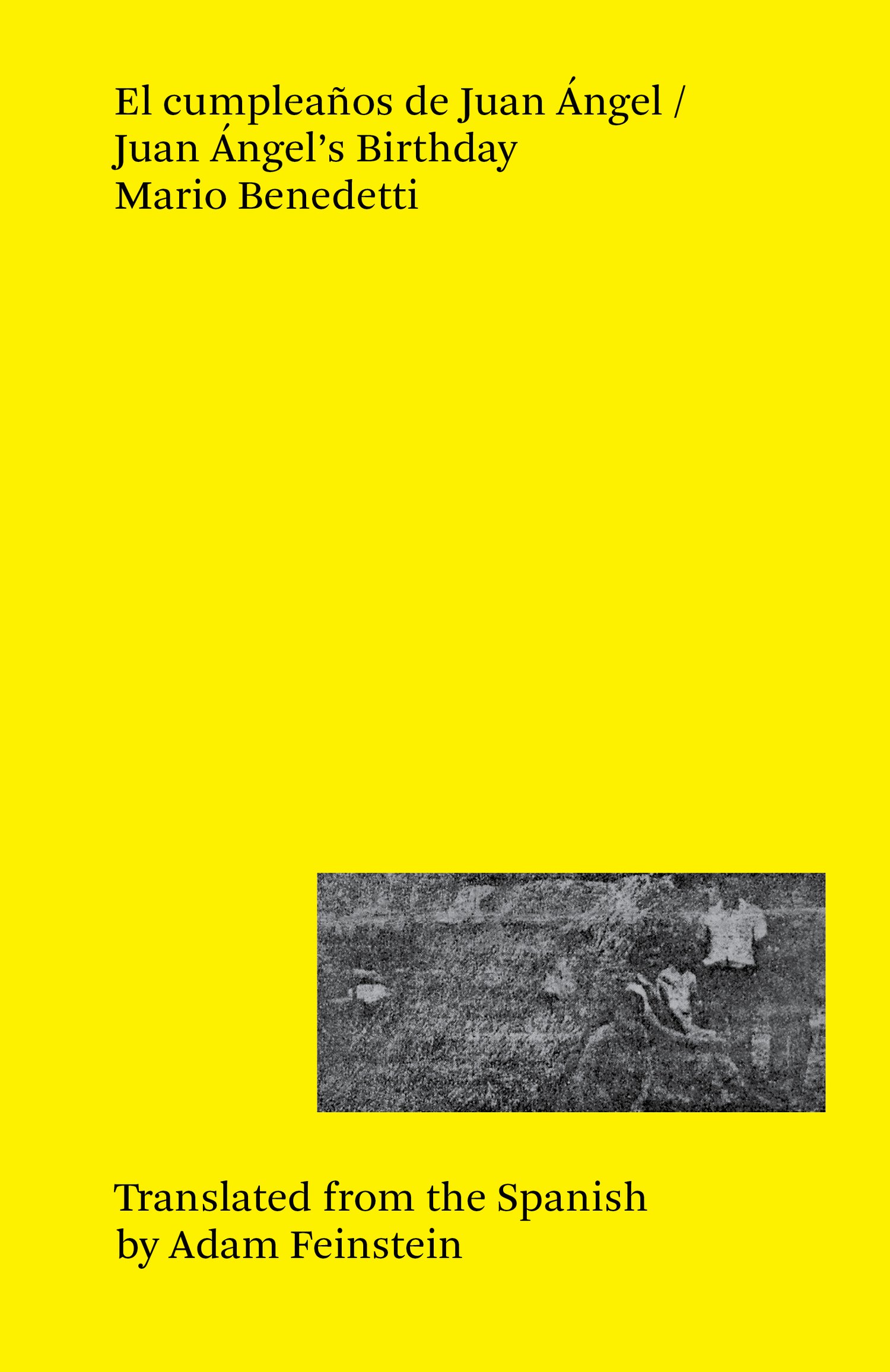
Mario Benedetti, El cumpleaños de Juan Ángel / Juan Ángel’s Birthday
£18.50
Tenement #11 / ISBN: 978-1-7393851-2-5
310pp [Approx.] / 140 x 216mm
Translated from the Spanish by Adam Feinstein
Edited by Dominic Jaeckle
Designed and typeset by Traven T. Croves
22.04.24
•
We must be accountable to every day.
Mario Benedetti
Mario Orlando Hamlet Hardy Brenno Benedetti Farugia—otherwise known as Mario Benedetti (1920-2009)—was an Uruguayan novelist, journalist, activist, and poet. A key member of the Generación del 45, Benedetti is oft celebrated throughout Latin America for his ‘direct’ verse, his poetry and prose focusing on complicity, on the acuity of ‘love, anger, and resistance’ in moments of political and civil unrest and upheaval (The Guardian).
A frequent contributor to the Uruguayan weekly, Marcha, Benedetti was instrumental in the establishment of the Frente Amplio / Broad Front movement, which sought to unify left-wing groups in 1960s Uruguay, and his writing has been translated into over eighty languages. Awarded the Reina Sofía Prize for Poetry (1999) and the Ibero-American José Martí Prize (2000), his novels have been adapted for the cinema (see La tregua / The Truce, 1960) and his poetry set to music by such artists as Catalan singer-songwriter Joan Manuel Serrat (notably on Serrat’s album El sur tambien existe / The south also exists, a passionate indictment of US foreign policy).
El cumpleaños de Juan Ángel / Juan Ángel's Birthday, published by Tenement Press in a first-time English language edition by Adam Feinstein, crystallises its author’s life-long efforts to explore the pluralist politics of complicity, care, and individual experience via a monologic study of the quickening of childhood, of innocence, and of adolescence against the backdrop of revolution and Uruguay’s Tupamaro guerrilla movement.
Written in 1971—three years prior to Uruguay’s descent into dictatorship—we follow our protagonist, Osvaldo Puente, as he adopts a nom de guerre, Juan Ángel, and joins the guerrilla on the front line. It is Puente’s birthday, and he is eight years old. As the hours shuttle by, the minutes turn to months, and—over the course of a single day—we see Puente sprint toward adulthood at pace. Cue a kaleidoscope of familial bonds stretched to breaking point, fractal agency, a curt dismantling of class—a weather system of love affairs and a withering of friendships—as Puente changes his name as evening draws in, aged thirty-three, with his commitment to the guerrilla’s cause ossified.
A single monologue in verse—thatching politics, pop culture, and a child’s eye on a world requiring a constant decipherment—Feinstein’s translation of Bededetti’s El cumpleaños de Juan Ángel is a brutal and searing rendition of this study of the sophistication of a political outlook and an ideological id in times of strife, need, and change.
•
See here for a further word on this title.
•
Stickered editions will carry a cover adornment; a distressed portrait of a Uruguayan family of sugarcane farmers excerpted from an article entitled ‘Esperando al guerrillero’ / ‘Waiting for the Guerrilla,’ Época (1965).
•
The work of Mario Benedetti, my friend and brother, is surprising in all its aspects, whether the varied extent of genres it touches, the density of its poetic expression or the extreme conceptual freedom it employs.
José Saramago
In Latin America and Spain, he is remembered above all as a poet who sought to speak of love and political commitment as directly and passionately as possible. By the end of his life, he had published more than 80 books, and in one of his last poems he gave the instructions: When I’m buried / don’t forget to put a Biro in my coffin.
Nick Caistor, The Guardian
Benedetti has crafted a portrait of the ‘long parenthesis’ opened up in Uruguay’s society, from which ‘nobody will be able to pick up the thread of the original sentence.’
New York Times Book Review
•
Mario Orlando Hamlet Hardy Brenno Benedetti, known as Mario Benedetti (1920-2009), was a Uruguayan journalist, novelist, and poet. He is considered one of the most important 20th century Latin American writers, especially in the Spanish-speaking world. A revolutionary and a passionate romantic, Benedetti wrote of love, anger, political resistance and redemption, particularly during the period of his enforced exile from Uruguay, between 1973 and 1985.
Adam Feinstein is an acclaimed British author, poet, translator, Hispanist, journalist, screenwriter, film critic and autism researcher. His biography of the Nobel Prize-winning Chilean poet, Pablo Neruda: A Passion for Life, was first published by Bloomsbury in 2004 and reissued in an updated edition in 2013 (Harold Pinter called it ‘a masterpiece’). Arc published his new book of translations, The Unknown Neruda in 2019, and another book of translations—this time of the great Nicaraguan poet, Rubén Darío—came out in two separate editions in 2020, first in Nicaragua itself and then by Shearsman in the UK. He has also published a collection of translations of the Cuban poet, José Martí. Feinstein has given numerous lectures around the world, including Mexico, Argentina, Chile, Nicaragua, Guatemala, the United States, Russia, China, India, Spain, Italy, Germany, Switzerland and the Netherlands. He broadcasts regularly for the BBC and writes for The Guardian, The Observer, the Financial Times and the Times Literary Supplement. His own poems and his translations (of Neruda, Federico García Lorca, Mario Benedetti, Roque Dalton and others) have been praised for their ‘power and possession’ and their ‘compelling fluency’ and have appeared in many magazines, including Agenda, Acumen, PN Review, Poem and Modern Poetry in Translation.